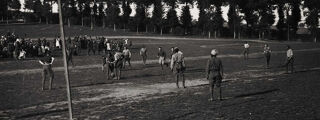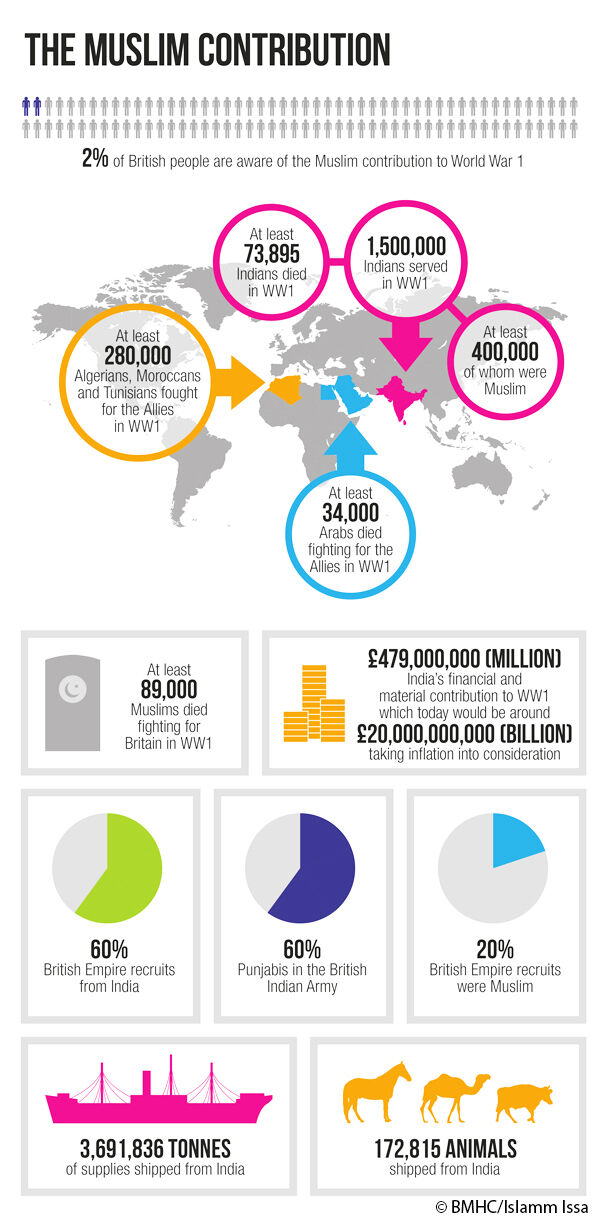Dr Islam Issa, a Senior Lecturer in English Literature at Birmingham City University, has increased knowledge and understanding around the contribution of Muslim soldiers fighting for the allies during WWI. This discovery led to a number of public engagement activities, effectively raising public awareness of Muslim contribution to the war and combating racial profiling after the Manchester Arena attacks in 2017.
Research summary
Dr Issa examined thousands of personal letters, historic archives, regimental diaries and census reports to find revealing that at least twice as many had fought in the war (885,000) than had been previously reported (400,000). He discovered that Muslims involved in the war effort came from as far away as Algeria, Morocco and Tunisia, and that at least 89,000 Muslims were killed fighting for Allied forces. The research brought to light previously unseen or unreported soldiers' letters, diary entries and photographs, which were reported widely. These gave insight into authentic stories that humanised the soldiers.
Research background
The UK Army identified a problem with the lack of diversity in the anticipated commemorations of the World War centenary in 2016. An ICM survey revealed that only 2% of the British public was aware of the extent of the Muslim contribution to the War. The British Muslim Heritage Centre (BMHC) responded by commissioning the Stories of Sacrifice project, half-funded by the Ministry of Defence’s Covenant Fund.
In 2015, Dr Issa was commissioned by the BMHC to help them research and curate the Stories of Sacrifice exhibition. The primary aim was to create free-to-access information. It was decided that a permanent exhibition would create awareness, be open to the public, schoolchildren of all ages, scholars, and official visits from army groups.
Dr Issa’s research methods draw on archival, literary, and community-based research and engagement. His research to date aims to reveal new narratives that challenge and re-examine familiar and seemingly exhausted topics through the application of a new cultural lens. Given access to archives at the British Library, National Archives, and the private-access National Army Museum, Dr Issa applied his style of literary research methods and aims to this largely unaddressed area of study on war history, and specifically the Muslim minority in WW1. The research utilised literary scholarship techniques, most importantly detailed textual and character analysis to examine and present, as works in their own right, literature formed of thousands of soldiers’ letters, officers’ regimental diaries, and other such materials. Traditional archival research involved days of trawling through documents to find new stories and statistics.
The research formed the basis of the BMHC’s Stories of Sacrifice permanent exhibition, which has toured the UK since 2016. It features previously undiscovered or unreported letters, photographs, and diary entries.
Outcomes and impact
The research has made a major impact in raising public awareness of the contribution of Muslim soldiers, allowing a significant shift in perceptions of often-marginalised communities, and those who were largely overlooked during WW1 centenary activities. Prior to the research only “2% of the British public was aware of the extent of the Muslim contribution to the war.” The exhibition had tens of thousands of visitors and 93% of those surveyed after visiting it expressed confidence about their knowledge of the Muslim contribution to the war.
The work had a direct impact on the modern Armed Forces, who held over a dozen group visits to the exhibition for military brigades and utilised Dr Issa's expertise to embed the findings in training days for cadets.
Greater Manchester Police requested a mobile version of the exhibition at its headquarters following the Manchester Arena Attacks in May 2017. The Force acknowledged the importance of the exhibition in helping its non-Muslim staff deal with the period, and how education about Muslim contributions helped combat racial profiling.
School lessons have also drawn directly on the unique findings. Free packs have been used by over 150 schools and over 1,000 students. In addition, more than 1,000 schoolchildren aged 6-18 visited the exhibition in a one-year period.
The research and its outcomes saw the project win Times Higher Education's Arts and Humanities Research Project of the Year 2019.



